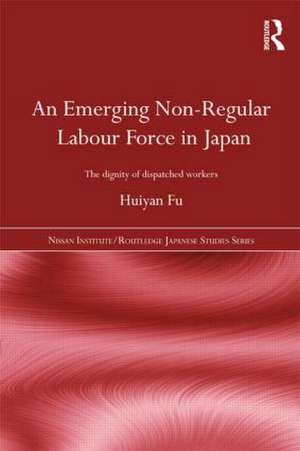An Emerging Non-Regular Labour Force in Japan: The Dignity of Dispatched Workers: Nissan Institute/Routledge Japanese Studies
Autor Huiyan Fuen Limba Engleză Paperback – 4 mar 2015
This is the first anthropological study of haken and temporary agency work (TAW) in Japan which combines both macro- and micro level analyses. At the macro level, haken are explored from a historical perspective with a view to showing the changing state policy and public perception of haken. At the micro level, how TAW is experienced by real people in concrete situations is extremely varied and complex, often depending on intersecting structural variables including gender, age and class. The book therefore provides insight into the gap between powerful discourses and everyday life, as well as a better understanding of personhood in Japan’s shifting landscape of employment.
This book will be of interest to students and scholars of Japanese Studies, Japanese Business, Asian Business and Asian Anthropology.
| Toate formatele și edițiile | Preț | Express |
|---|---|---|
| Paperback (1) | 461.86 lei 6-8 săpt. | |
| Taylor & Francis – 4 mar 2015 | 461.86 lei 6-8 săpt. | |
| Hardback (1) | 1053.16 lei 6-8 săpt. | |
| Taylor & Francis – 12 aug 2011 | 1053.16 lei 6-8 săpt. |
Din seria Nissan Institute/Routledge Japanese Studies
-
 Preț: 286.69 lei
Preț: 286.69 lei -
 Preț: 318.39 lei
Preț: 318.39 lei - 9%
 Preț: 1003.95 lei
Preț: 1003.95 lei -
 Preț: 289.04 lei
Preț: 289.04 lei - 25%
 Preț: 852.53 lei
Preț: 852.53 lei -
 Preț: 495.94 lei
Preț: 495.94 lei -
 Preț: 486.42 lei
Preț: 486.42 lei -
 Preț: 271.61 lei
Preț: 271.61 lei -
 Preț: 420.08 lei
Preț: 420.08 lei - 18%
 Preț: 1057.40 lei
Preț: 1057.40 lei -
 Preț: 465.49 lei
Preț: 465.49 lei -
 Preț: 414.39 lei
Preț: 414.39 lei - 18%
 Preț: 1003.30 lei
Preț: 1003.30 lei - 18%
 Preț: 1056.80 lei
Preț: 1056.80 lei -
 Preț: 465.69 lei
Preț: 465.69 lei -
 Preț: 415.24 lei
Preț: 415.24 lei -
 Preț: 485.46 lei
Preț: 485.46 lei - 13%
 Preț: 298.13 lei
Preț: 298.13 lei - 18%
 Preț: 1061.57 lei
Preț: 1061.57 lei - 18%
 Preț: 1105.56 lei
Preț: 1105.56 lei - 18%
 Preț: 1055.69 lei
Preț: 1055.69 lei - 18%
 Preț: 1058.79 lei
Preț: 1058.79 lei - 18%
 Preț: 1165.24 lei
Preț: 1165.24 lei - 15%
 Preț: 538.45 lei
Preț: 538.45 lei -
 Preț: 415.67 lei
Preț: 415.67 lei - 28%
 Preț: 820.32 lei
Preț: 820.32 lei - 15%
 Preț: 511.27 lei
Preț: 511.27 lei -
 Preț: 492.11 lei
Preț: 492.11 lei - 18%
 Preț: 1271.47 lei
Preț: 1271.47 lei -
 Preț: 438.47 lei
Preț: 438.47 lei -
 Preț: 451.16 lei
Preț: 451.16 lei - 23%
 Preț: 342.12 lei
Preț: 342.12 lei -
 Preț: 408.54 lei
Preț: 408.54 lei - 18%
 Preț: 948.21 lei
Preț: 948.21 lei -
 Preț: 412.37 lei
Preț: 412.37 lei - 27%
 Preț: 1001.60 lei
Preț: 1001.60 lei - 18%
 Preț: 1061.57 lei
Preț: 1061.57 lei - 28%
 Preț: 849.77 lei
Preț: 849.77 lei - 26%
 Preț: 820.73 lei
Preț: 820.73 lei - 18%
 Preț: 1053.16 lei
Preț: 1053.16 lei - 18%
 Preț: 1390.04 lei
Preț: 1390.04 lei - 18%
 Preț: 777.75 lei
Preț: 777.75 lei
Preț: 461.86 lei
Nou
Puncte Express: 693
Preț estimativ în valută:
88.37€ • 92.27$ • 73.14£
88.37€ • 92.27$ • 73.14£
Carte tipărită la comandă
Livrare economică 05-19 aprilie
Preluare comenzi: 021 569.72.76
Specificații
ISBN-13: 9781138858183
ISBN-10: 1138858188
Pagini: 192
Ilustrații: 10 black & white illustrations, 11 black & white tables, 10 black & white line drawings
Dimensiuni: 156 x 234 mm
Greutate: 0.28 kg
Ediția:1
Editura: Taylor & Francis
Colecția Routledge
Seria Nissan Institute/Routledge Japanese Studies
Locul publicării:Oxford, United Kingdom
ISBN-10: 1138858188
Pagini: 192
Ilustrații: 10 black & white illustrations, 11 black & white tables, 10 black & white line drawings
Dimensiuni: 156 x 234 mm
Greutate: 0.28 kg
Ediția:1
Editura: Taylor & Francis
Colecția Routledge
Seria Nissan Institute/Routledge Japanese Studies
Locul publicării:Oxford, United Kingdom
Public țintă
Postgraduate and UndergraduateCuprins
1. Introduction 2. Haken: A New Non-Regular Labour Force and a Booming Industry 3. Working as a Haken in a Triangular Employment Relationship 4. Haken in Historical Perspective 5. Haken in the 'Gap-Widening' Society 6. The Search for Meaningful Work 7. Conclusion: Haken’s ‘Symbolic’ Values
Notă biografică
Huiyan Fu is Visiting Professor of International Business at Aalen University, Germany.
Recenzii
"This timely and excellent analysis of the changing employment system in Japan greatly improves our understanding of what it is like to be a dispatched worker (haken) in contemporary Japan and discourse about nonregular employment, of which haken is only one of various categories such as temporary, contract, part-time, etc." - Jeff Kingston is director of Asian Studies, Temple University Japan; The Japan Times: Sunday, Nov. 27, 2011
Descriere
Like many industrialised nations, the current employment trend in Japan centres on the diversification of the labour market with an increased use of temporary labour. Among a wide range of non-regular labour arrangements, haken, or 'dispatched workers' are a newly legalised category of non-regular workers who are typically employed by the employment agency while working at the facilities of and being under the authority of the client firm. In recent years, their numbers have expanded exponentially under the state’s deregulation policy and assumed considerable symbolic significance in public debate, especially with regard to the nation’s ‘widening gaps’.
Contrasting sharply with the Japanese post-war salarymen/women model haken generate internal cultural debate where ‘traditional’ and ‘global’, or ‘positive’ and ‘negative’ values are juxtaposed, contradicted, and negotiated. The debate between and among various interest groups and powerful actors in turn provides important clues to the constantly changing relationship of the individual to the state, to firms, to entrepreneurial opportunities, and to the wider world. Drawing on a range of ethnographic data and documented materials, the book seeks to bring a better understanding of personhood in Japan’s shifting landscape of employment.
Huiyan Fu's book will be of huge interest to students and scholars of Japanese business, organisational behaviour, employment relations and Japanese anthropology.
Contrasting sharply with the Japanese post-war salarymen/women model haken generate internal cultural debate where ‘traditional’ and ‘global’, or ‘positive’ and ‘negative’ values are juxtaposed, contradicted, and negotiated. The debate between and among various interest groups and powerful actors in turn provides important clues to the constantly changing relationship of the individual to the state, to firms, to entrepreneurial opportunities, and to the wider world. Drawing on a range of ethnographic data and documented materials, the book seeks to bring a better understanding of personhood in Japan’s shifting landscape of employment.
Huiyan Fu's book will be of huge interest to students and scholars of Japanese business, organisational behaviour, employment relations and Japanese anthropology.
















